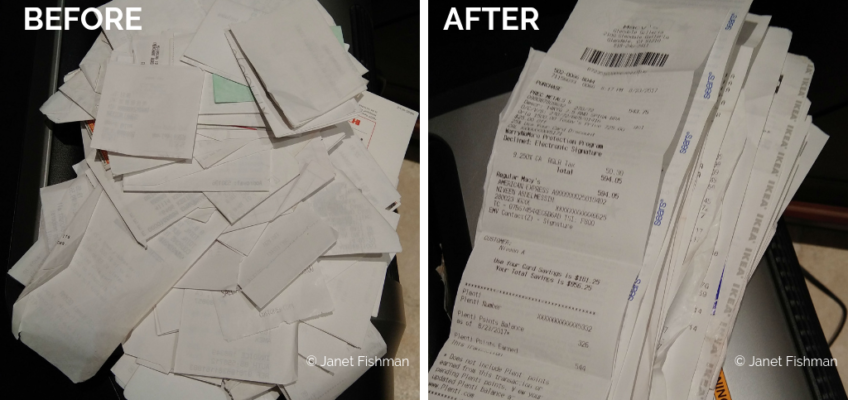We get handfuls of these tiny pieces of paper every day…..at the gas station, grocery store, parking lots, restaurants, car washes, clothing stores, dry cleaners, drive-thrus….you name it, they hand us a little receipt for our purchases. Often times, people crumble them up in their hands, pockets, purses, wallets, laptop bags, briefcases, cars, tote bags, etc. These make a mess and are an organizer’s nightmare having to unfold hundreds and thousands of these crunched receipts which take hours to unfold. It is strenuous on the fingers and on the eyes.
Here are some tips to organize receipts–you, your bookkeeper, your CPA, and your professional organizer will appreciate having the receipts unfolded, like-with-like, and all in the same direction.
1. Do not crumble the receipts. If they do get squished, unfold them, align them all in the same direction, and lie them flat.
2. Before you categorize your receipts, decide if you will be keeping them short or long-term. An example of short-term is the receipt for your gallon of juice. You can keep this receipt until you finish the bottle or there might be instances where you have to return it because the food was spoiled. After this point, you can throw them away unless you want them for budgeting purposes. For long-term, an example is a medical expense. You need to keep the receipts for your medications and doctor’s appointments for potential tax deductions purposes.
3. File the receipts accordingly in your filing system. Your filing system can be file folders or three-ring binders with zipper pockets or inserts that have pockets. The categories should be alphabetized. Examples of categories:
- Bank
- Donations
- Education
- Entertainment
- Gifts
- Insurance
- Licenses
- Meals
- Postage
- Professional fees
- Rent
- Travel
- Utilities
4. Do not wrap the receipts around coupons. Separate them. Collect, clip, save and organize your coupons based on the design of the store you shop at.
5. Remove the receipts from your purse or bag daily or several times a week. Staple the purchase receipt to the credit card receipt if you paid by a credit card so you do not enter duplicate charges as a business expense.
6. Do not save receipts by shoving them into plastic bags. Use vertical or horizontal desk organizers or store them in large envelopes to retain their flat position.
7. When you get a receipt, write a notation at the top, e.g. “B” for business, if you run a
8. Go paperless. The receipts from many stores are printed on thermal paper which fades with time and they will be unreadable in the long run. Protect your receipts by either photocopying them or keeping digital copies. There are receipt scanners and trackers (apps) that you can use to store your receipts electronically. You can search your receipts on your computer and mobile phone.
Here are some examples of scanners:
- Fujitsu ScanSnap iX500 Color Duplex Desk Scanner
- NeatReceipts Mobile Document Scanner and Digital Filing System for PC and Mac
- Brother Mobile Color Page Scanner
- Epson WorkForce DS-30 Portable Document & Image Scanner
Here are some examples of apps:
- Expensify: Receipts and Expenses
- Receipts by Wave
- Shoeboxed Receipt Tracker
- Smart Receipts
Veryfi – Receipts and Expenses
If you do not want to use a scanner or an app, you can also take photos of your receipts, import, and organize them on your computer. Make sure to create a backup on the cloud or an external hard drive just in case something happens with your computer or mobile phone.
9. Keeping receipts can help you start a budget. Monitoring how much you spend can help you save money because you will have a clear picture on where your money goes.
Be consistent in organizing your receipts. They are important in keeping track of your expenses whether you are a business owner or not. You should develop a good filing system for your receipts. If you do need to refer to an old receipt, make sure you put it back in its appropriate place. One of the benefits of organizing your receipts is you will be ready when it is time to do your income tax returns. Your receipts will have been organized by categories all year round so tallying them up will be quick.

